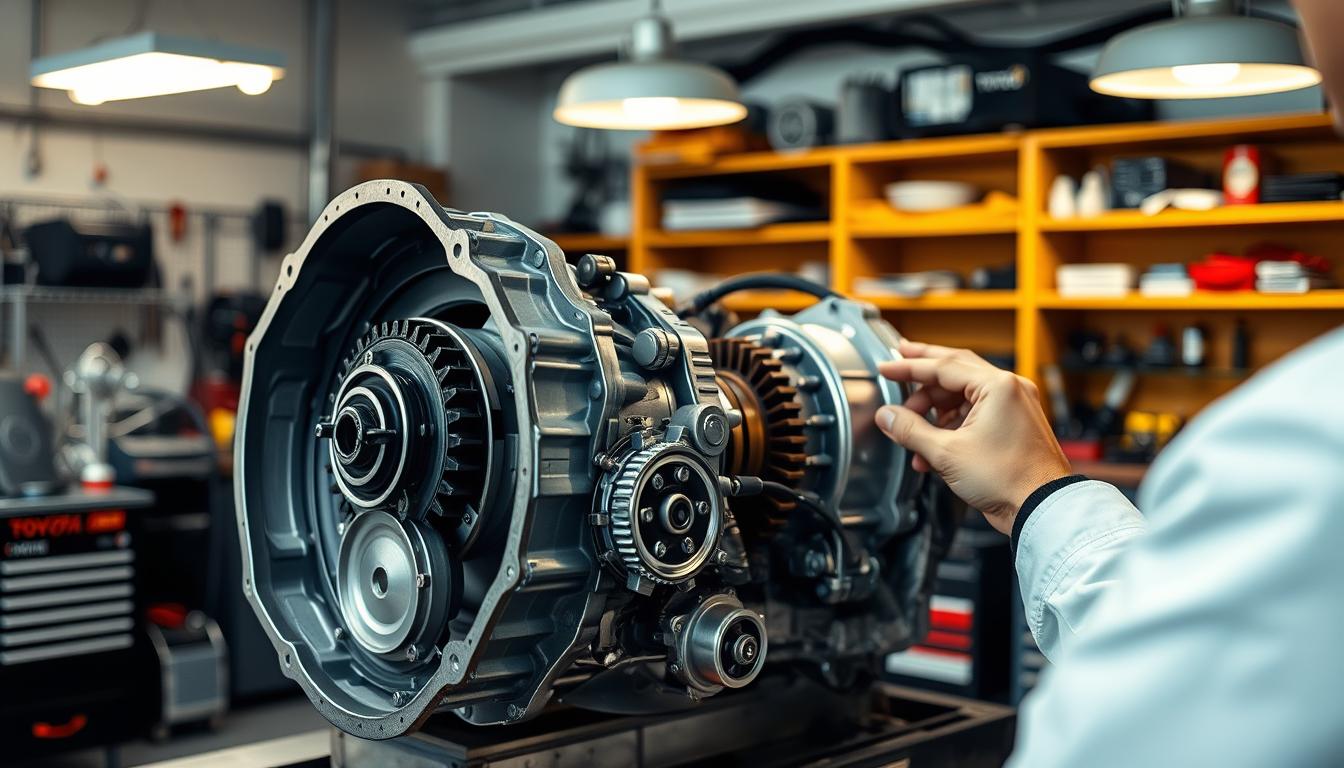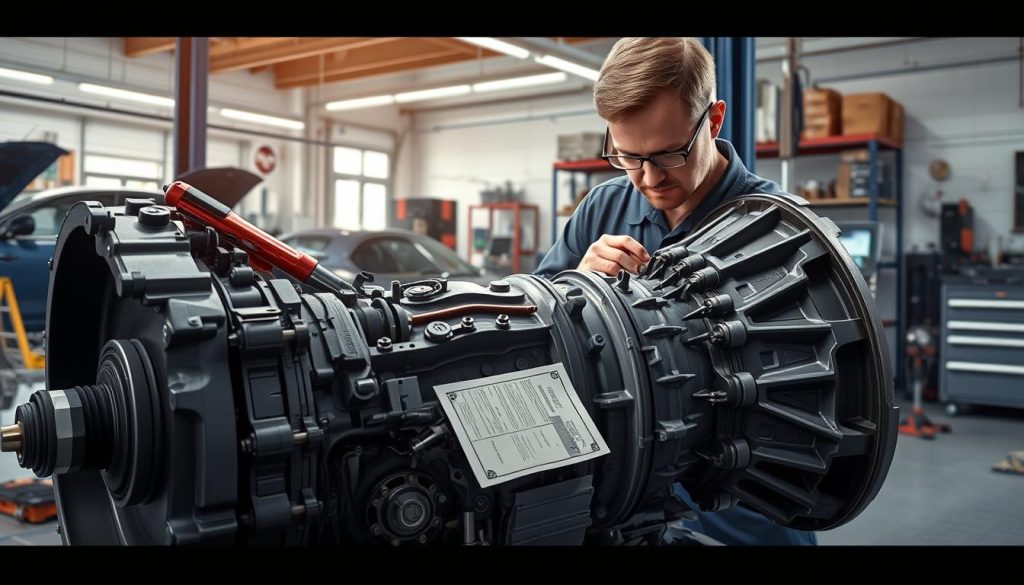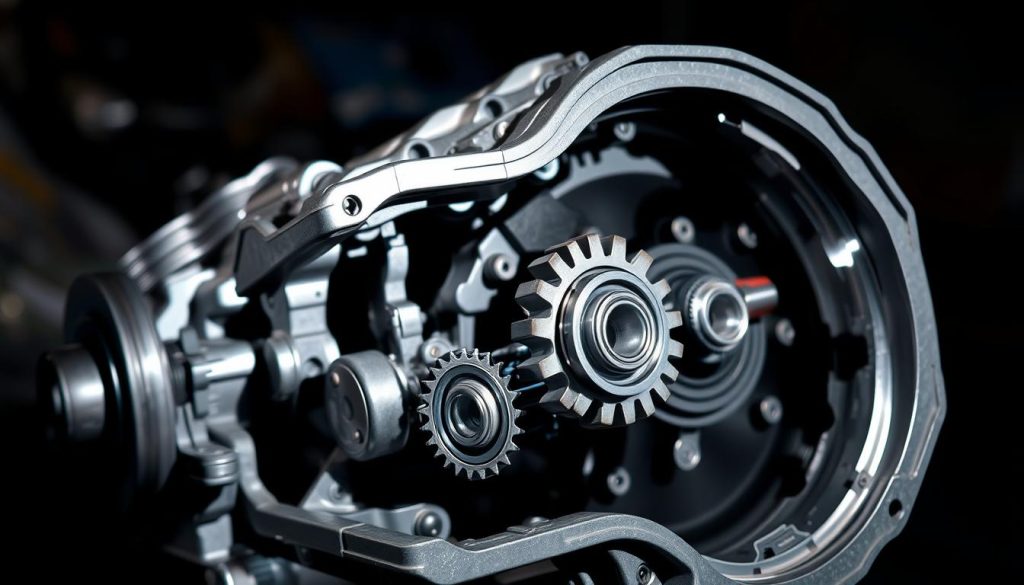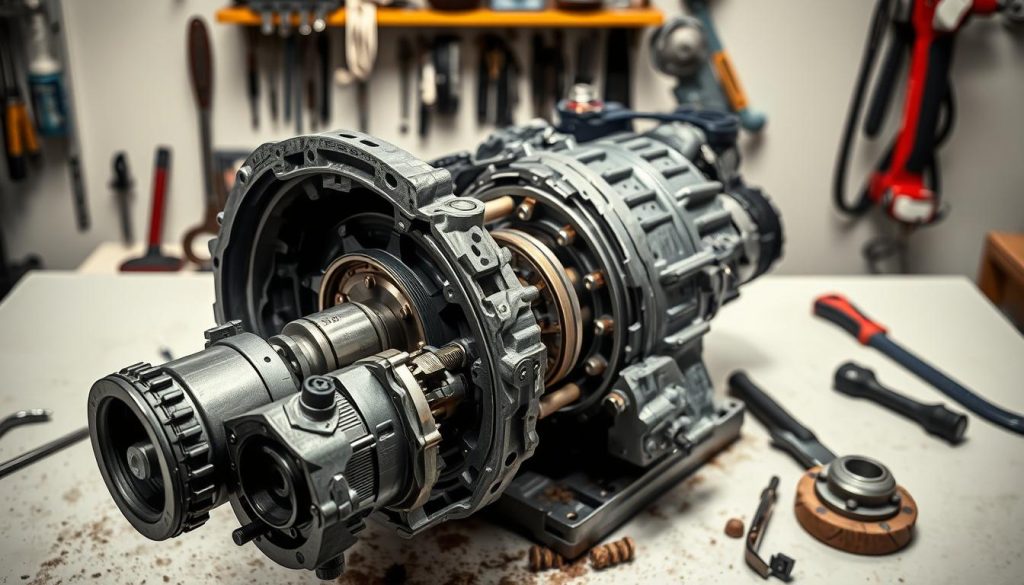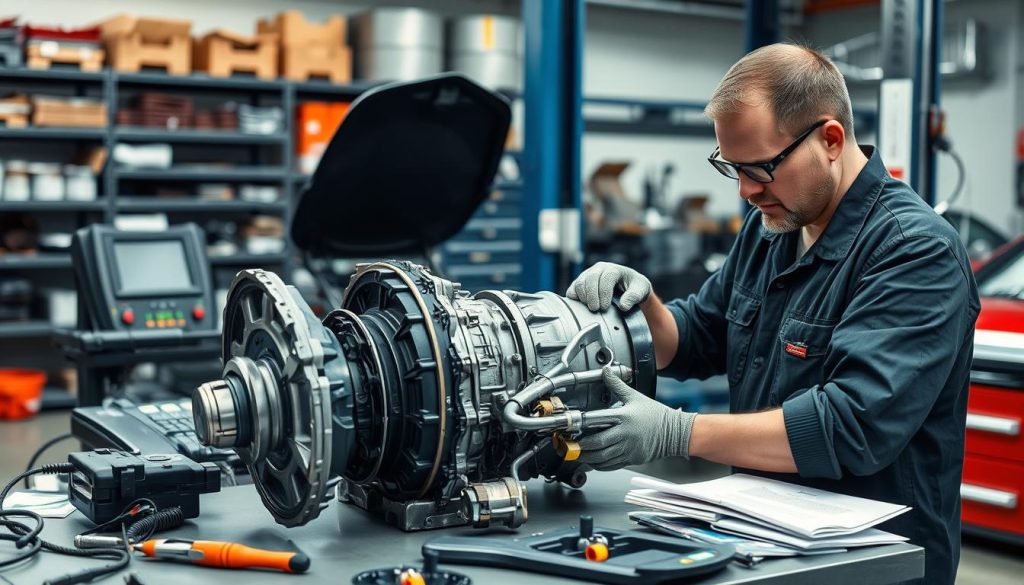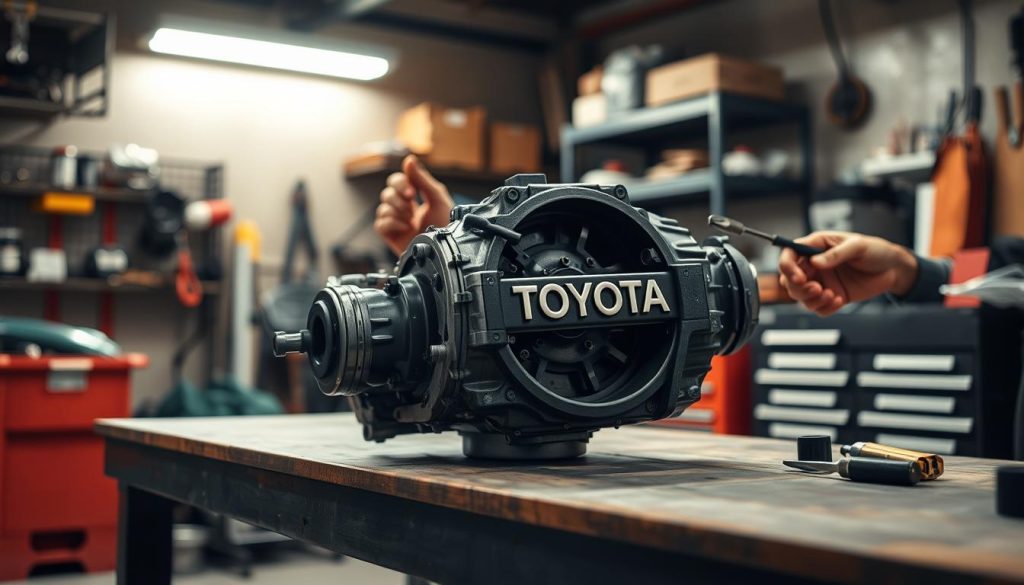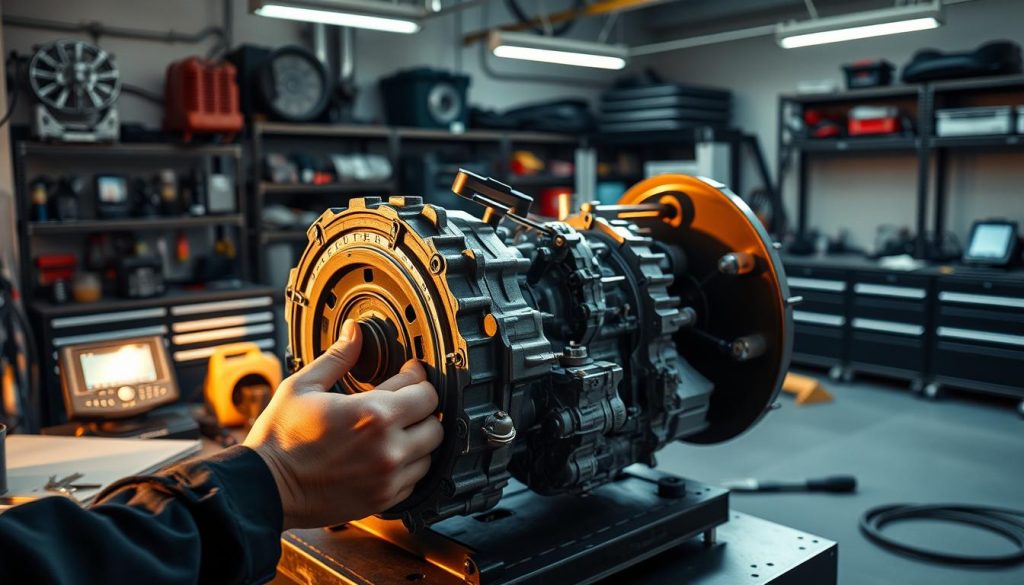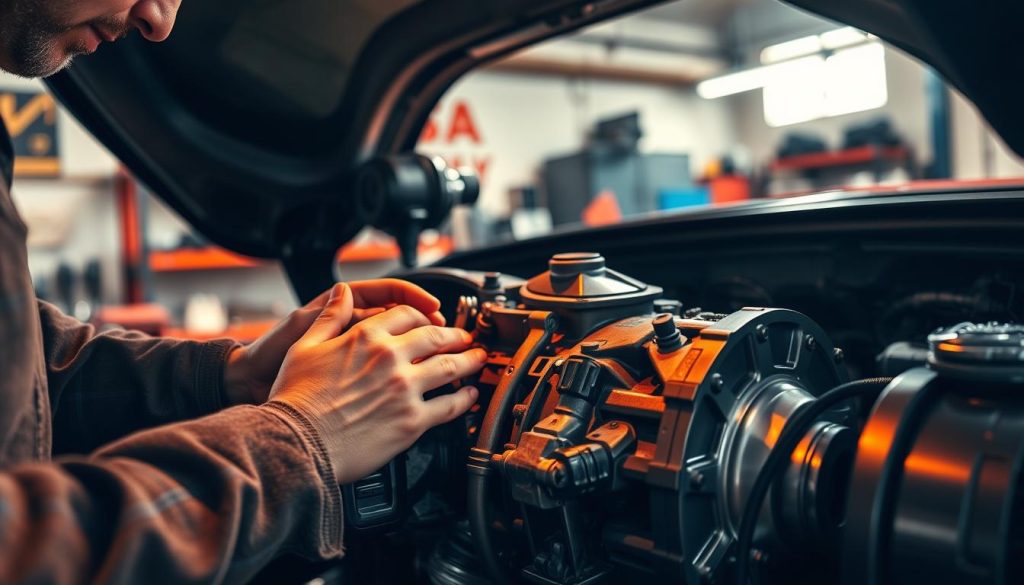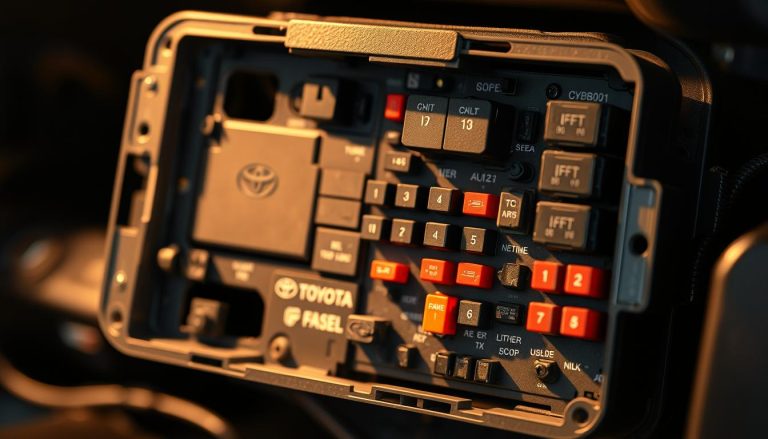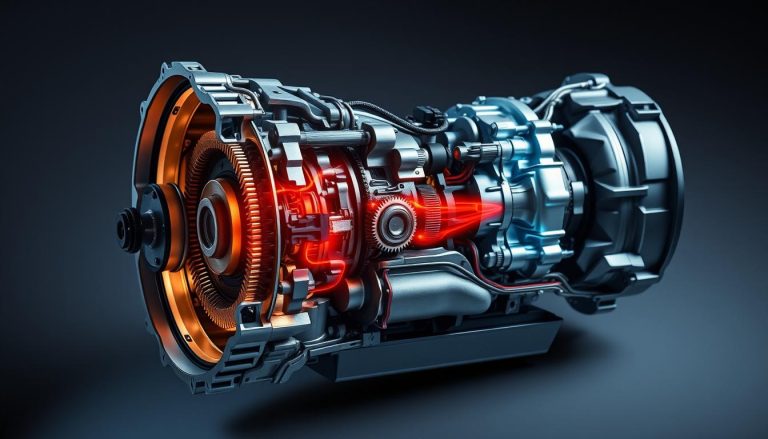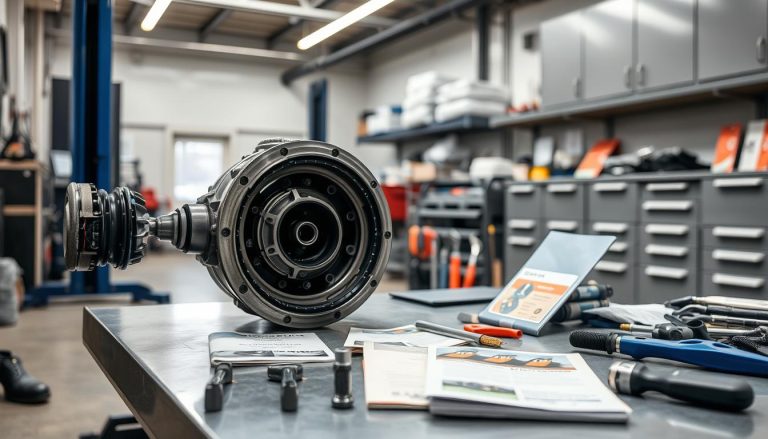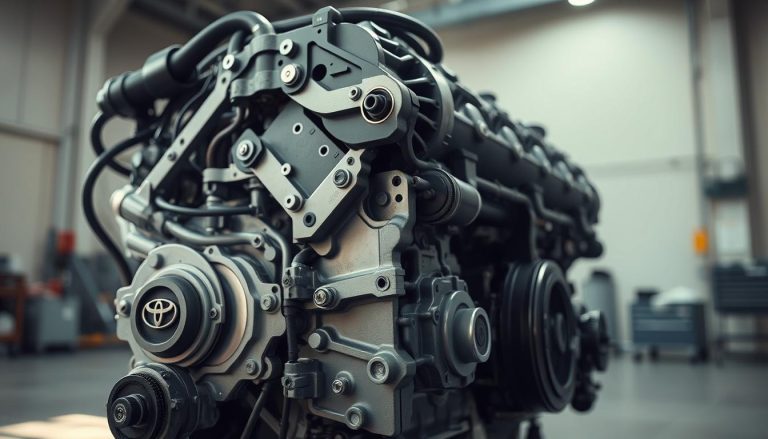Diagnose & Fix Toyota Transmission Noise
Toyota transmission noise is more than just a nuisance. It often signals deeper problems with your car’s transmission. It’s vital to tackle these noises quickly to keep your vehicle in top shape and avoid expensive fixes. This guide will show you how to spot and solve common Toyota transmission issues.
Learning to diagnose and repair your Toyota’s transmission is key. We’ll cover why acting fast is important, what noises to watch out for, and why you should trust a pro for repairs.
If you own a Toyota, knowing about different transmission noises is a must. It helps you make smart choices about your car’s upkeep. From figuring out grinding or whining sounds to clunking or buzzing, this guide will give you the tools to keep your Toyota running well.
Introduction to Toyota Transmission Noise
The transmission is key in any vehicle, linking engine power to wheel motion. Knowing about Toyota transmission noise issues is vital for your car’s health. Catching problems early can stop small issues from becoming big ones.
Understanding Transmission Systems
Transmission systems are complex, with gears, clutches, and fluid working together. It’s important to know how these parts work to spot Toyota transmission noise problems.
Automatic and manual transmissions work differently. Automatics might have fluid issues, while manuals can have mechanical problems like worn-out parts. Learning to spot these differences is key to diagnosing transmission noise.
Importance of Timely Diagnosis
Timely diagnosis is very important. Spotting unusual sounds early means quick fixes and less damage. Delaying diagnosis can lead to bigger problems and costly repairs.
Early detection keeps your car running longer and safer. Fixing transmission noise quickly reduces risks and saves money in the long run.
Common Toyota Transmission Noises
Understanding different types of noises in your Toyota’s transmission can help you fix problems. Each noise hints at a specific issue, making it easier to find solutions.
Grinding noises usually mean worn-out clutches in manual transmissions or damaged gears in automatics. This noise is a sign of serious wear and needs immediate attention.
Whining noises often point to low transmission fluid or issues with the torque converter. Also, contaminants in the fluid can cause these sounds.
Clunking noises suggest loose transmission mounts or worn U-joints. Both problems affect the transmission’s stability and need quick fixing to prevent more damage.
Lastly, humming or buzzing noises are less serious but should not be ignored. They usually come from minor fluid issues and can be fixed with simple solutions.
By listening to your vehicle, you can troubleshoot Toyota transmission noise effectively. This saves time and money on unnecessary repairs.
Causes of Grinding Noise in Toyota Transmissions
Grinding noises in Toyota transmissions are a warning sign. They tell us something is wrong. Knowing what these noises mean helps us fix the problem. This ensures our transmissions work well for a long time.
Worn Clutch in Manual Transmissions
In manual transmissions, a worn-out clutch is often the cause. A worn clutch can’t disengage right, causing grinding sounds. Replacing the clutch when needed is key to fixing these noises.
Gear Damage in Automatic Transmissions
Automatic transmissions might make grinding noises if their gears are damaged. This happens when gears don’t line up right. Keeping them well-lubricated and fixing small problems early helps prevent this.
Synchro Wear
Synchronizers, or synchros, help gears shift smoothly. When they wear out, shifting becomes rough, and grinding noises occur. Regular checks and knowing the signs of wear are important for fixing these issues.
Diagnosing Whining Noise in Toyota Transmissions
Whining noises from your Toyota transmission can be alarming. They often point to problems that need fixing. To diagnose transmission noise well, knowing the usual causes is key. Focus on issues related to the fluid.
Low Transmission Fluid
Low transmission fluid is a big cause of whining noises. Not enough fluid means more friction and less lubrication. This makes the transmission whine. It’s important to check and top off the fluid regularly for the best Toyota transmission noise repair.
Worn Torque Converter
A worn torque converter can also cause whining. It’s important for sending power from the engine to the transmission. When it’s worn out, it doesn’t work right, leading to strange sounds. Replacing it is often the best fix.
Fluid Contamination
Dirty transmission fluid is another common problem. Dirt and other stuff in the fluid can cause poor lubrication. This wears down the transmission parts. Regular fluid changes and using the right fluid are key for Toyota transmission noise repair.
Clunking Noise: Causes and Solutions
Heard a clunking noise in your Toyota’s transmission? It’s unsettling. This problem can come from many sources. It needs quick transmission repair to avoid more damage. Let’s look at common causes and how to fix addressing transmission clunking noise.
Loose Transmission Mounts
Loose or broken transmission mounts can cause a clunking sound. This happens when the transmission moves too much. Tightening or replacing these mounts usually fixes the problem.
Worn U-Joints or CV Joints
U-joints and CV joints connect the transmission to the wheels. They allow for flexibility and rotation. But, they can wear out over time. This leads to a clunking sound when you accelerate, slow down, or turn. Checking and replacing these joints is key in transmission noise troubleshooting.
Internal Transmission Damage
Internal damage, like worn gears or bearings, can also cause a clunking noise. This damage needs a detailed check and might need a lot of transmission repair. Fixing these problems quickly can stop bigger issues later.
Addressing Humming or Buzzing Noise
Humming or buzzing noises in your Toyota’s transmission can mean worn bearings or fluid issues. It’s key to diagnose transmission humming early to avoid more damage.
An unusual buzzing sound often points to fluid level problems. The right fluid level is vital for smooth operation. Check the fluid level with a dipstick while the engine runs and your car is level.
Worn bearings can also cause humming. These bearings help gears rotate smoothly. When they wear out, they make noise. Fixing this early can fix Toyota transmission buzzing and extend your transmission’s life.
Here’s a quick way to find the noise’s cause:
- Fluid Level Check: Make sure the transmission fluid is at the right level.
- Visual Inspection: Look for leaks or fluid contamination.
- Listen for Patterns: Note when the noise is loudest (e.g., during acceleration).
- Bearings Examination: Check the bearings for wear or damage.
- Professional Diagnosis: If the problem doesn’t go away, get a pro to diagnose transmission humming.
In short, fixing a humming or buzzing noise in your Toyota’s transmission needs careful checks and quick action. Regular maintenance and quick action to odd sounds can keep your car running well.
The Risks of Ignoring Transmission Noises
Ignoring transmission noises in your Toyota can lead to severe consequences. It can harm your vehicle’s longevity and performance. It’s important to address these noises quickly to avoid high repair costs and safety hazards.
Potential for Severe Damage
Transmission noises often mean there’s a problem that can get worse. Issues like gear damage or fluid leaks can turn into bigger problems. If not fixed, they might even cause your transmission to fail, which is very expensive.
Impact on Driving Safety
Transmission noises can also mean your car’s safety is at risk. A bad transmission can make your car hard to control, leading to accidents. It’s key to keep your transmission working well for safe driving.
Costly Repairs
Ignoring transmission sounds can also lead to high repair costs. Fixing major transmission damage is much pricier than fixing small problems early. Regular checks and quick fixes can save you a lot of money.
Why Professional Diagnosis is Essential
Modern Toyota transmissions are complex, needing a professional transmission diagnosis to find and fix problems. Trying to fix it yourself can cause more harm and might even void your warranty.
Experts use advanced tools to find the real cause of transmission problems. This careful method avoids unnecessary damage and fixes issues quickly. For Toyota transmission service, trusting experts means your car will run well and you’ll feel confident.
Here are key reasons why getting a Toyota transmission service is vital:
- Advanced Diagnostic Tools: Pros use special gear to check your transmission’s health accurately.
- Expert Technicians: Trained pros can handle tough transmission problems well.
- Warranty Protection: Getting your car serviced by pros keeps your warranty safe.
- Timely Interventions: Catching problems early can stop them from getting worse and costing a lot.
Getting regular Toyota transmission service from a trusted pro keeps your car running well for a long time. It makes sure your drives are smooth and reliable.
The Process of Professional Transmission Repair
Fixing a Toyota transmission professional repair process is key to solving any problems. This method keeps your car running well for a long time. It also makes sure it performs at its best. Let’s look at each step closely.
Initial Inspection
The first thing done is the initial inspection. Experts check the car to find any problems or odd sounds. This first look helps them see the car’s condition and what needs fixing right away.
Detailed Diagnosis
After the first check, a detailed diagnosis follows. Technicians use special tools to find the real problems. They check the fluid, look at electrical connections, and test how the transmission works. This detailed check finds out exactly what’s wrong.
Repair or Replacement
After finding the problems, the next step is to decide if it needs fixing or replacing. Small problems like leaks or worn parts can be fixed. But big damage might mean the whole transmission needs to be replaced. This ensures the car works well.
Testing and Quality Assurance
The last step is very important in the Toyota transmission professional repair process. After fixing or replacing, the car is tested a lot. It’s driven in different ways to check if everything works right. This final test makes sure the transmission works smoothly and safely.
| Stage | Actions Taken | Purpose |
|---|---|---|
| Initial Inspection | Visual check and noise assessment | Identify immediate concerns |
| Detailed Diagnosis | Use of diagnostic tools | Pinpoint exact issues |
| Repair or Replacement | Component repair or full replacement | Address specific problems |
| Testing and Quality Assurance | Extensive road testing | Ensure reliability and safety |
DIY Fixes vs. Professional Service
Deciding between Toyota DIY transmission fixes and professional transmission services is tough. DIY fixes can save money but come with risks. Let’s look at both options to help you decide.
- Toyota DIY Transmission Fixes
- Pros
- Can save money on labor costs
- Get to work on your car right away
- Feel a sense of accomplishment and learn something new
- Cons
- There’s a risk of making things worse
- You might not have the right tools
- DIY fixes don’t come with a warranty
- Pros
- Professional Transmission Services
- Pros
- Certified mechanics with lots of experience
- They use advanced tools for accurate fixes
- Repairs come with a warranty for peace of mind
- Cons
- It costs more because of labor and parts
- You have to schedule an appointment
- Pros
While Toyota DIY transmission fixes might seem appealing to save money, they can be risky. Professional transmission services are usually safer and more reliable. They ensure your car is fixed right, keeping it running well for a long time.
Troubleshooting Toyota Transmission Noise
Fixing transmission noise in your Toyota involves finding the noise’s source, using troubleshooting methods, and knowing when to get help. Understanding these steps helps you tackle the problem better.
Identifying the Source of Transmission Noise
To tackle troubleshooting Toyota transmission noise, start by finding where the noise comes from. Notice if the noise happens when you speed up, slow down, or shift gears. This info helps pinpoint the problem and makes DIY transmission noise diagnosis more precise.
Common Troubleshooting Techniques
After finding the source, use these common troubleshooting techniques:
- Check Transmission Fluid: Make sure the transmission fluid is at the right level and clean. Low or dirty fluid can cause strange noises.
- Inspect Belts and Gears: Look for belts or gears that are worn out or damaged. They can cause grinding or whining sounds.
- Examine the Torque Converter: A bad torque converter can make whining noises, mainly in automatic transmissions.
These steps are key to DIY transmission noise diagnosis and can fix small problems.
When to Seek Professional Help
If these steps don’t fix the troubleshooting Toyota transmission noise, it’s time to get a pro involved. Persistent noises might mean serious issues like internal damage or wear. Experts are needed to fix these problems right.
Preventative Maintenance to Avoid Transmission Noise
Using transmission noise prevention techniques is key for a quiet ride. Regular maintenance can lower the chance of transmission noise and extend your car’s life. Here are some important steps to take:
Regular Fluid Checks
Keeping an eye on your Toyota’s transmission fluid is essential. Low or dirty fluid can cause friction and noise. Check the fluid every few months and replace it as Toyota suggests.
Scheduled Maintenance
Following your car’s maintenance schedule is also vital. Look at your owner’s manual for service times. Sticking to these schedules helps catch problems early and prevents big issues.
Safe Driving Practices
Safe driving habits are also important for your transmission. Avoid sudden acceleration, hard braking, and heavy loads. Smooth driving reduces wear and keeps your transmission quiet and efficient.
Toyota Transmission Noise: Seeking Professional Help
If your Toyota’s transmission is making strange noises, getting professional help is key. Toyota certified repair services offer top-notch care. They use special tools and have the right know-how.
- Access to high-tech diagnostic equipment designed for Toyota vehicles
- Experienced technicians who know Toyota transmission systems inside out
- Warranty benefits that often come with Toyota certified repair services
Choosing Toyota certified repair services means your car gets the best care. Any problems are fixed right, keeping your car running smoothly. Whether it’s grinding, whining, or clunking, experts can fix it. This not only solves the problem but also stops it from getting worse.
Conclusion
Fixing Toyota transmission noises quickly is key to keeping your car in top shape. Knowing the sounds your Toyota makes helps you act fast to fix any issues. Getting help from experts ensures problems are found and fixed right, stopping more damage.
Getting advice from transmission experts helps you find and fix the noise’s cause. This advice, along with regular maintenance and checks, makes your transmission last longer. It keeps your car running well and saves you money on repairs.
Being proactive with your car’s transmission care is important. It means acting quickly and getting expert help. This way, your Toyota stays safe, efficient, and reliable. Make these habits a part of your car care routine to avoid expensive fixes later.
FAQ
What are the common transmission noises in Toyota vehicles and their causes?
Toyota vehicles can make grinding, whining, clunking, humming, or buzzing sounds. These noises can be caused by worn clutches, damaged gears, low transmission fluid, or worn bearings.
How can I diagnose a grinding noise in my Toyota transmission?
Grinding noises often mean worn clutches in manual transmissions or damaged gears in automatics. They can also be due to worn synchronizers. Each problem needs detailed repairs or replacements.
What should I do if my Toyota transmission makes a whining noise?
Whining sounds usually mean low transmission fluid, worn torque converters, or dirty fluid. Keeping the fluid level and quality right is key to fixing these problems.
What are the main causes of clunking noises in Toyota transmissions?
Clunking noises often come from loose transmission mounts, worn U-joints or CV joints, or serious internal damage. These issues need careful attention.
How can I address humming or buzzing noises from my Toyota transmission?
Humming or buzzing might point to worn bearings or the wrong transmission fluid levels. Finding and fixing these problems is important to stop the noise.
Why is it important not to ignore unusual transmission noises?
Ignoring strange noises can cause big mechanical problems, risk safety, and lead to high repair costs. It’s vital to get them checked and fixed quickly.
What is the importance of professional diagnosis for Toyota transmission issues?
Getting a pro to diagnose your transmission ensures the right problem is found without causing more damage. Experts use special tools and know-how to fix issues well.
What does the process of professional transmission repair involve?
Repairing a transmission professionally includes checking it first, then diagnosing, fixing or replacing parts, and testing it last. This thorough method makes sure all problems are fixed.
Are DIY fixes recommended for Toyota transmission problems?
DIY fixes are risky and limited compared to professional help. Pros ensure repairs are safe, work well, and keep warranties valid, which DIY can’t match.
How can I prevent transmission noise in my Toyota vehicle?
To avoid transmission noise, check the fluid regularly, follow the maintenance schedule, and drive safely. These steps help reduce wear on the transmission.
When should I seek professional help for my Toyota transmission noise?
If DIY fixes don’t work or if the noise suggests serious problems, get a pro. They can find and fix the issue accurately and effectively.

